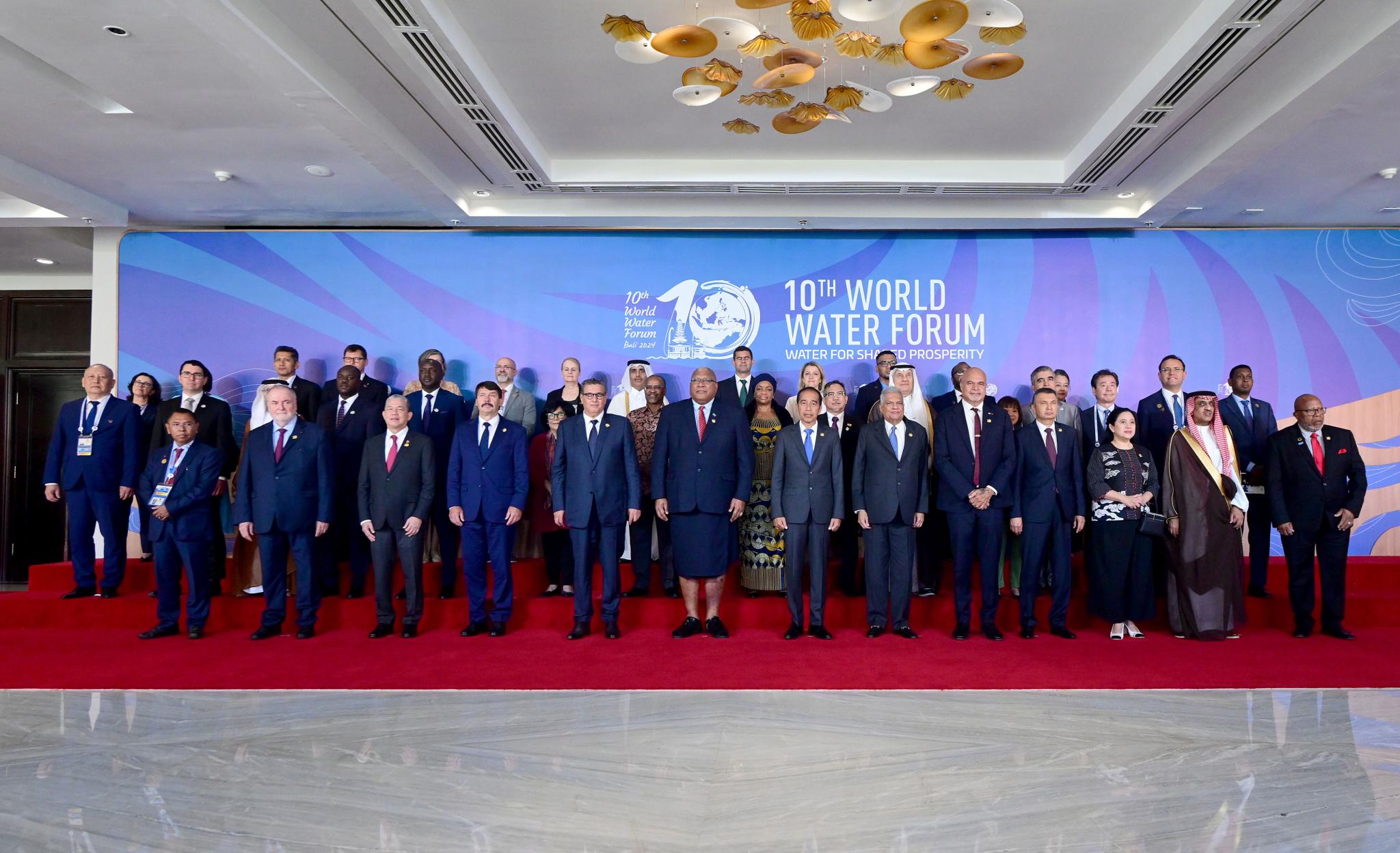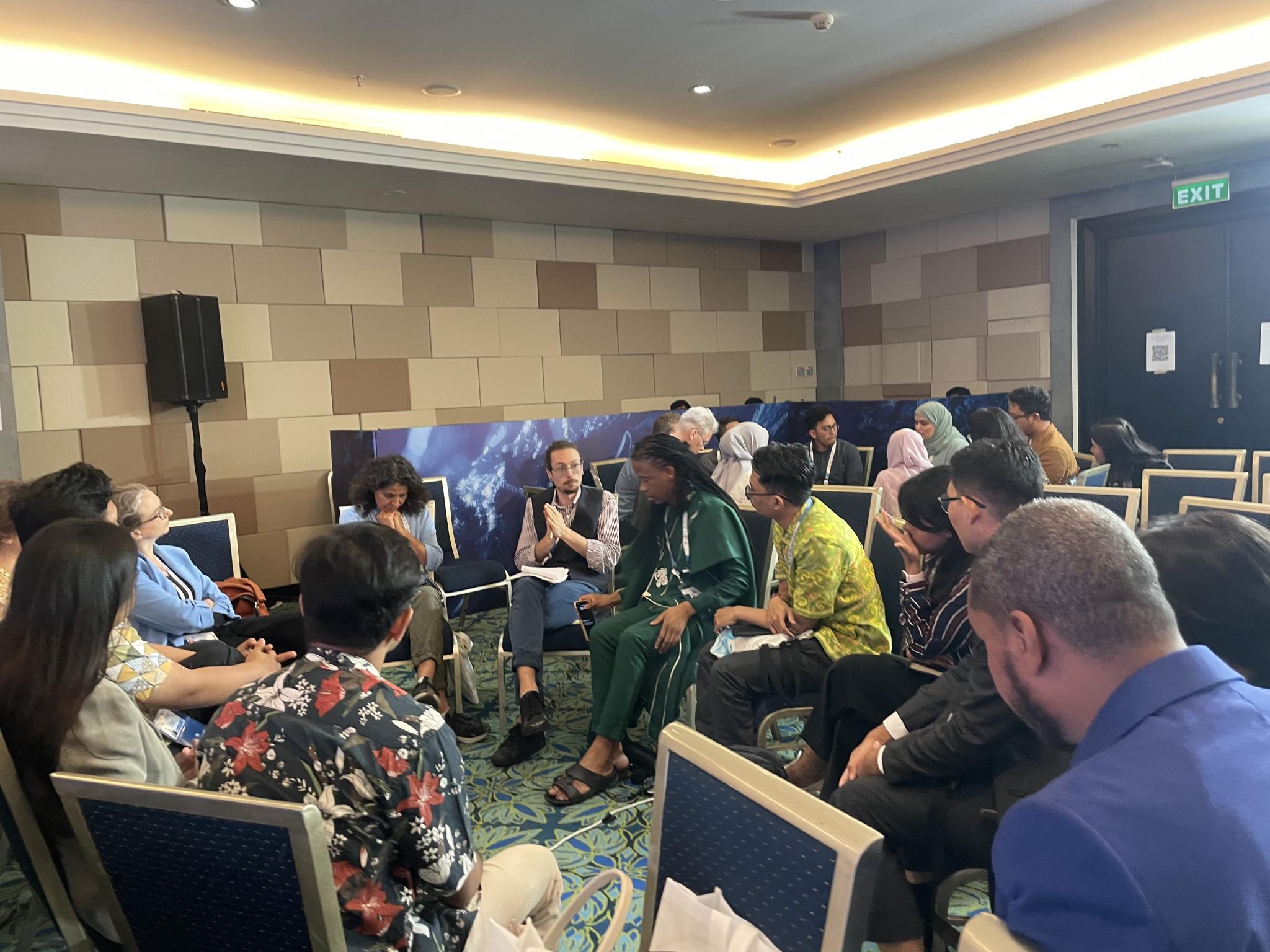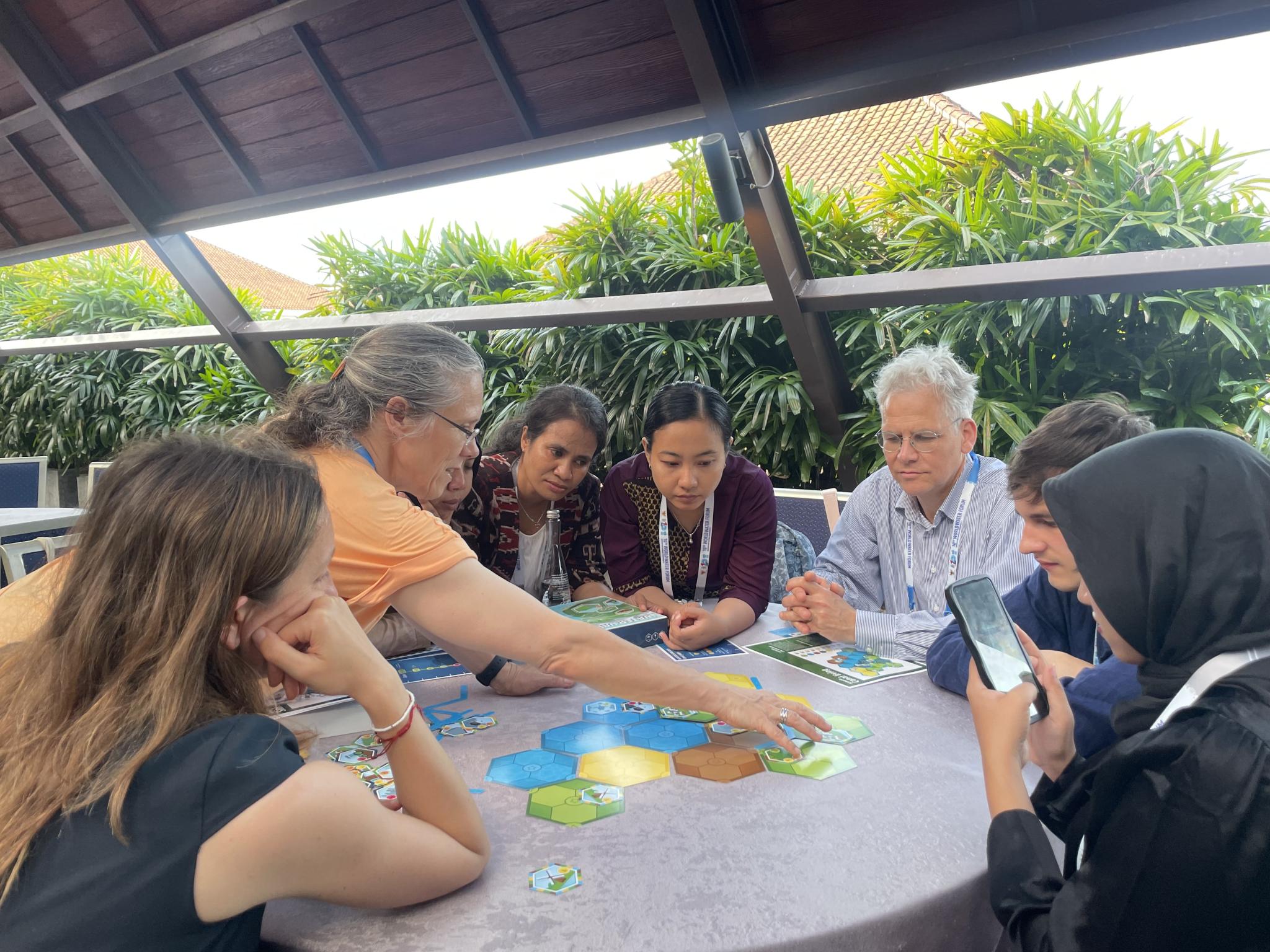by Carlien Donkor, Carola Hein and Matteo D'Agostino
Preparations, Expectations, and Outcomes for the Activities of PortCityFutures at the 10th World Water Forum
In continuation of the UN 2023 Water Conference in New York, where PortCityFutures (PCF) and the UNESCO Chair Water, Ports and Historic Cities (WPHC) co-organized several activities under two official side events, UN of Rivers, Deltas and Estuaries and Water and Heritage, the team worked with various institutions and colleagues throughout the year to prepare for the 10th World Water Forum (WWF) in Nusa Dua, Bali. The WWF – the largest triennial international meeting of diverse stakeholders in the water sector (World Water Council, n.d.) – took place from 18 to 25 May 2024 and was co-hosted by the World Water Council and the Republic of Indonesia. This year’s edition carried the title: “Water for Shared Prosperity.” We attended the inauguration activities, including the Balinese water purification ceremony (Melasti) and an official opening dinner, attended also by the President of Indonesia, Joko Widodo, who opened the High Level Meeting Session, emphasizing the urgency for digital collaboration in water resource management. He compellingly referred to water as “the next oil” in global economics and ecology (Bureau of Press, Media and Information of the Presidential Secretariat, 2024).

Key Activities and Takeaways
The 10WWF presented an opportunity to not only showcase the work of the UNESCO Chair but also to exchange with other international water-related programs and projects that work to ensure sustainable and just water futures through interdisciplinary collaboration and innovation. The group from PortCityFutures and the UNESCO Chair Water, Ports and Historic Cities has been involved in the setup of the conference and various sessions, developing themes and activities. We participated notably in sessions on capacity building, governance and education, connecting historic and heritage water spaces and practices to the future. In particular, the PCF delegation prepared a number of thematic sessions under topic T6B which focused on “Innovative Organizational Approaches” in partnership with Women in Water & Sanitation Network, Speak Up Africa and Watermarq. We were selected to lead session T6B3 Transformative Change for the Future Water-Smart Society, building upon the examples of organizational innovation presented earlier to concretize good practices and methodologies that create new pathways for water-smart futures. We organized an official side event involving the University event at two Subak sites, discussed in a separate blog, and attended other sessions as speakers and discussants too. We also held two workshops to introduce our educational game Water Values and contributed two case studies in the exhibition of the Global Network of Water Museums (WAMU-Net) on ancestral hydro technologies.
T6B Innovative Organizational Approaches
Session T6B1 Framing legacy and innovative approaches to understanding and implementing organizational change focused on organizational innovation for more sustainable water management, illustrated through case studies (covering legal cases, public authorities, private utilities, peer mentorship, irrigation, finance, and links to expert knowledge) and a roundtable framed by policy recommendations from PCF’s interdisciplinary journal Blue Papers. The discussions continued at T6B2 New interventions and integrative approaches for solving complex challenges: first, showcasing examples of communications and advocacy, citizen science, and collaboration, and second, discussing innovation and technology across the utilities sector, while also announcing the launch of the Africa Test Bed Network.
As organizers of session T6B3, we once again highlighted the value of collaboration between science-policy-action. In advance, we had prepared short videos with the speakers so they could introduce attendees to their work and topics. This allowed for devoted time to audience-speaker interaction during the actual event. The session was divided into three parts. First, speakers pitched key points of practices from around the world on how science-policy-action interlinkages can drive progress toward SDG6, based on six themes, namely: activating Indigenous knowledge and science, organizing hackathons for river basin organizations (RBOs), Water-Oriented Living Labs (WOLLs), engaging the youth through water museums, translating science for policy and action, and inclusive governance. The speakers then led six roundtable discussions – including the audience – on methodological approaches. The group discussing groundwater highlighted the lack of transparency in monitoring aquifers worldwide despite the growing awareness triggered by youth groups and other grassroots. The hackathon group highlighted their value in providing means to ensure integrated decision-making by citizens, the local administration, as well as central government bodies.

The main takeaways from the group discussions were that to carry out impact-driven research and “write for” policy makers, it was necessary to integrate traditional values with scientific knowledge and ensure local stakeholder engagement through traditional and community leaders and influencers. Key questions included: “How do we reimagine our water worlds? How can water stories help?”, “How do you determine the border of water and bring in those who are far away but key players?” and “What do you commit to take forward, and who do you need to do it? What are the barriers?” The T6B4 synthesis event was introduced by former Water Envoy Henk Ovink and brought together organizers, speakers and the audience from sessions T6B1–3.
Sessions on Capacity Building and Reconceptualization
The PCF group also presented parts of our work at session T6E3: Increasing smart access to water-related educational materials, including Blue Papers, the online courses Water Works and Water Systems Design, and the serious game Water Values. These support our UN commitments to advance analytical approaches on water through space and time, to promote historic knowledge and traditional wisdom as a foundation for future thinking, to provide a platform for free exchange of knowledge, experience and data, to facilitate capacity building, to activate networks and evaluate impact while leveraging academic research for professional development (Port City Futures, 2023a, 2023b).
The UNESCO Chair WPHC, Carola Hein, was invited by the Organisation for Economic Co-operation and Development (OECD) as a discussant in their session T4C1 Together apart: Linking ocean and freshwater policies for a thriving blue economy to react to their report on “The Blue Economy in Cities and Regions.” This follows the validation of her work on port city territories by the OECD’s “city-basin” approach, which links cities, ocean and freshwater policies. Blue Papers is also mentioned in the OECD Handbook on the local implementation of the OECD Principles of Water Governance. Carola was asked: “In the context of multiple pressing crises, it can be challenging for governments – especially local ones – to think more long-term. Concretely, how can local policymakers and stakeholders promote more long-term thinking and build knowledge (not just data) to feed into blue economy decision-making?” She responded with the need to: 1) promote the importance of long-term thinking past, present and future; 2) facilitate value-based approaches for inclusive and sustainable water futures; 3) develop multi-scalar, spatial approaches for territorial governance systems, starting with basins.
During the event, we led multiple Water Values playing sessions. With the help of a colleague from the Dutch Pavilion, we organized an impromptu round and hosted another short session at the UNESCO Pavilion. Water Values relates the necessity for collaboration between three key water sector domains: technology, economy, and culture. The game introduces players to the layeredness of natural, cultural landscapes, and the importance of intangible practices embedded in technology, economy, and culture for achieving mutual well-being. Carlien Donkor, who was part of the PCF delegation, made contributions to WAMU-Net’s exhibition “The Voices of Water,” which was displayed in the Italian Pavilion all week. Both cases on ancestral hydro technologies in Nzulezo (Ghana) and Subak (Indonesia) featured a multi-screen telecast of age-old water structures and practices that are inspirational and instrumental in realizing water-smart visions and systems for tomorrow. As part of the exhibition, Carola was invited to give a keynote at the UNESCO Pavilion, where Indigenous communities were represented in the thematic discourse on integrating their traditional water systems into contemporary ecological transitions.

Conclusions and Next Steps
Overall, the 10WWF was filled with an atmosphere of curiosity, effort and action for propelling interdisciplinary and cross-sectoral exchanges, and collaborations to achieve the Water Action Agenda beyond SDG6. The synthesis session T6B reiterated and further promoted the concrete outcomes and prospective collaborations offered in the sessions. Reflecting on our week at the 10WWF, our PCF team feels encouraged to continue our efforts on making an impact beyond current research investment and interest areas. We are excited to continue publishing, fostering joint initiatives, and building a broad inclusive community.
To be continued . . .
Acknowledgment
Our participation in the 10th World Water Forum was funded by Delft Global, Leiden Global and PortCityFutures Center / TU Delft Chair History of Architecture and Urban Planning. The exhibition on Nzulezo was partly made possible by the Creative Industries Fund NL.
This blog post has been written in the context of discussions in the LDE PortCityFutures research community. It reflects the evolving thoughts of the authors and expresses the discussions between researchers on the socio-economic, spatial and cultural questions surrounding port city relationships. This blog was edited by the PortCityFutures editorial team: Eliane Schmid.
References
Bureau of Press, Media and Information of the Presidential Secretariat. (2024). President Opens 10th World Water Forum High Level Meeting, Emphasizes Global Solidarity in Water Governance. Retrieved July 29, 2024, from https://www.presidenri.go.id/foto/presiden-buka-high-level-meeting-ktt-world-water-forum-ke-10-tekankan-solidaritas-global-dalam-tata-kelola-air/.
Port City Futures. (2023a). Declaration of Commitments by the organizing members of ‘The United Nations of Rivers, Deltas and Estuaries’ contributing to the UN 2023 Water Conference in New York. Retrieved July 29, 2024. https://www.portcityfutures.nl/uploads/cfpcf/attachments/20230324_Commitments%20UN%20of%20Rivers%202.pdf
Port City Futures. (2023b). Declaration of Commitments by the organizing members of ‘Water and Heritage: Connecting Past, Present and Future’ contributing to the UN 2023 Water Conference in New York. Retrieved July 29, 2024, from https://www.portcityfutures.nl/uploads/cfpcf/attachments/20230323_Commitments%20water%20and%20heritage_FINAL_Leiden%5B1%5D_2.pdf
World Water Council. (n.d.). A World Event. Retrieved August 31, 2024, from https://www.worldwatercouncil.org/en/world-event.
